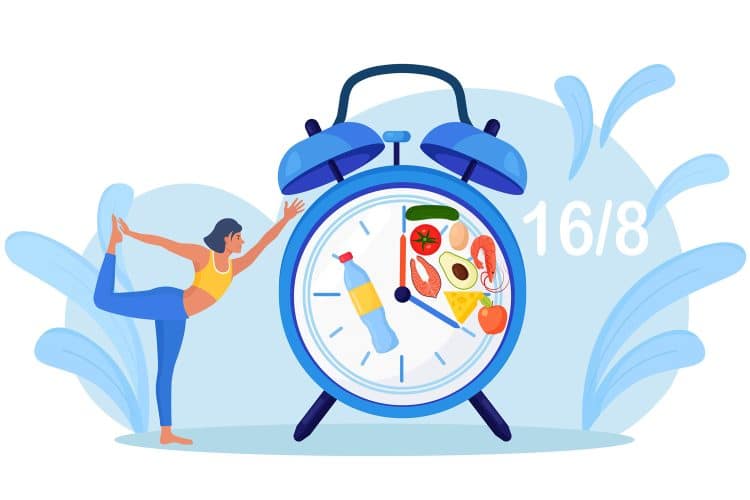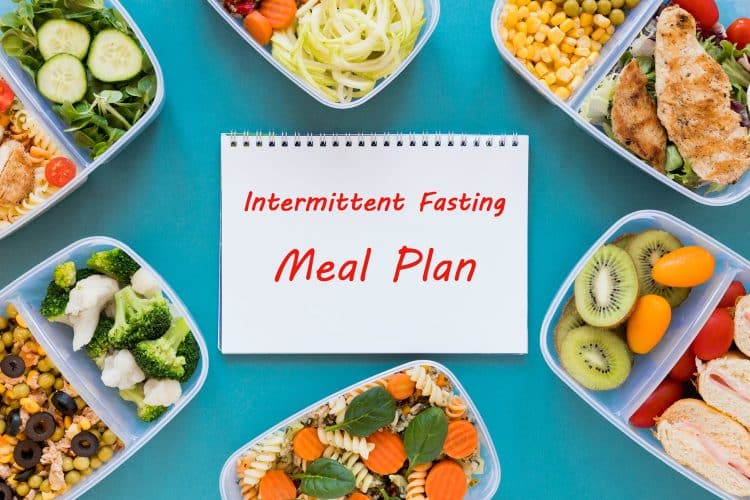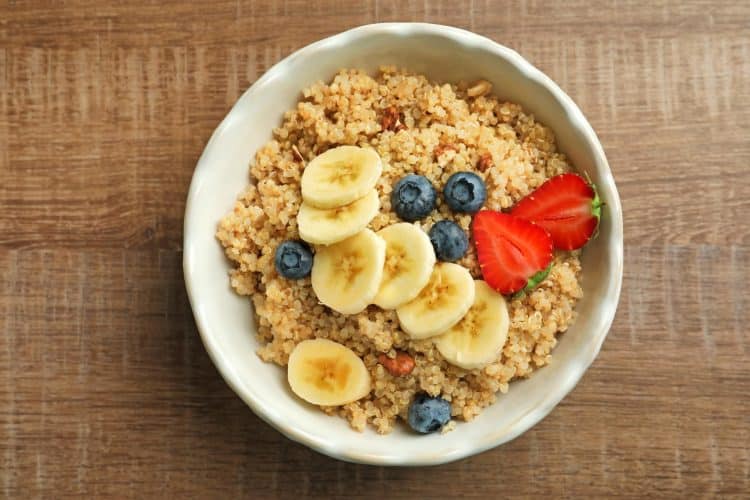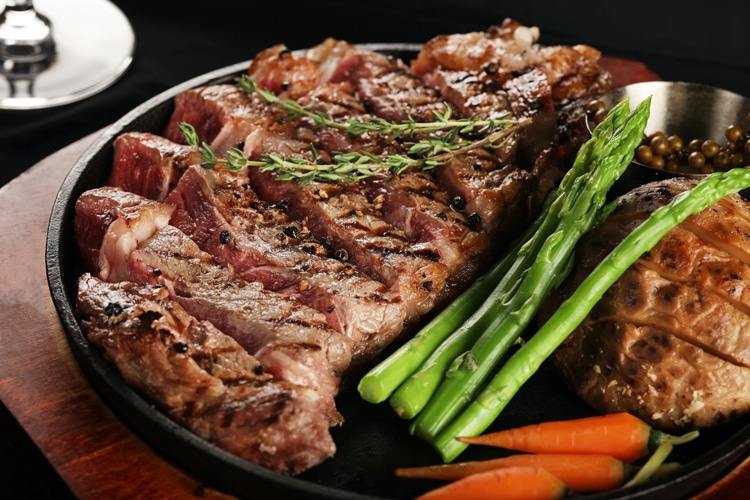If you’re like most people, you probably think of fasting as something you do when trying to lose weight. Intermittent fasting has been shown to help people lose weight. It’s not just a fad dieting technique, it really works! In fact, more than 40 studies proved that intermittent fasting (IF) can have several health benefits, including reducing inflammation, improving brain function, and protecting against heart disease.
But if you’re new to intermittent fasting, planning your meals around a fasting schedule can be a bit daunting.
In this article, we’ll give you everything you need to know about intermittent fasting meal planning so that you can start reaping the benefits of this diet program.
What is Intermittent Fasting?
Intermittent fasting involves alternating between periods of fasting and eating. There are several different ways to do intermittent fasting, but the most common is the 16/8 method, which involves fasting for 16 hours and eating in an eight-hour window.

Let’s say you want to start an IF diet, you can share your food intake into 3 meals. For example, your day may start at 8 am, you can have the first meal at noon, then an afternoon snack at 4 pm, and finally dinner at 8 pm. At this point, you would begin your 16-hour fast, and the next day the cycle starts over again.
Notably, while following an IF diet, you’re allowed to eat whatever you want — you just have to do it within the eight-hour window each day. That said, many people naturally eat less while following an intermittent fasting schedule because they’re not as hungry.
Intermittent Fasting Meal Plan
Now that you know the basics of intermittent fasting, let’s move on to meal planning. As mentioned before, one of the great things about intermittent fasting is that there are no hard and fast rules about what you can and cannot eat. However, a few guidelines can help make your transition to this way of eating a bit easier.
First and foremost, it’s important to ensure that you’re getting enough protein and healthy fats through your meals. These nutrients will help keep you full and satiated throughout the day so you’re not tempted to snack between meals.
 Intermittent Fasting Meal Plan
Intermittent Fasting Meal Plan
Additionally, include plenty of fresh fruits and vegetables in your diet. Not only are they packed with essential vitamins and minerals, but they’ll also help fill you up without adding a lot of extra calories to your diet.
Finally, don’t forget about healthy carbohydrates like whole grain bread and pasta — they can also play an important role in helping you stick to your intermittent fasting plan by providing lasting energy throughout the day.
[sc name=”style-summary2″ ]
Pro Tip
If you’re thinking about giving intermittent fasting a try, then meal planning will be an important part of your success. Fortunately, it’s not as difficult as it might look. By following the tips above and incorporating plenty of protein-rich foods, healthy fats, and fresh fruits and vegetables into your diet, you’ll be on your way to enjoying all the benefits this healthy way of eating has to offer.
[/sc]
Which Meal is Best to Skip During Intermittent Fasting
When it comes to intermittent fasting, there’s a lot of debate about which meal is best to skip. Some say it’s dinner, so you’re not eating late at night and messing up your sleep cycle. Others say it’s breakfast because you’re giving your body a break from digesting food first thing in the morning.
We’re here to make the case for skipping breakfast. Here’s why we think it’s the best meal to miss when you’re intermittent fasting.
You’re Not Eating as Much Anyway
If you’re like most people, you probably don’t eat a huge breakfast. Maybe you have a slice of toast or yogurt, but chances are you’re not eating a full three-course meal first thing in the morning. So, if you’re not eating much anyway, why not just skip breakfast?
It’ll Help You Sleep In
Let’s be honest — most of us would love to sleep in every morning. But if you have to make time for breakfast, that means getting up early. If you skip breakfast, though, you can hit snooze and enjoy some extra shut-eye. Who doesn’t want that?

You Can Feast at Lunch Instead
If you’re worried about being too hungry by lunchtime, don’t be. When you intermittently fast, your body goes into what’s called “fasting mode.” This means that your body starts burning fat for energy instead of relying on food for fuel. So even though you’re not eating breakfast, your body will still have plenty of energy to get you through the morning. And that means you can really enjoy your big lunch later on.
[sc name=”style-summary-2nd” ]
Pro Tip
At the end of the day, it’s up to you to decide which meal is best to skip when intermittent fasting. But if we had to make a case for any meal, it would definitely be breakfast. Skipping breakfast is an easy way to get a few extra hours of sleep, and it won’t make much of a difference in terms of hunger since your body will be burning fat for energy anyway. Plus, who doesn’t love a feast at lunchtime?
[/sc]
5 Best Types of Food to Eat While Intermittent Fasting
When it comes to intermittent fasting, there are a lot of rules. No food for 16 hours? Check. Only eat in an eight-hour window? Got it.
But when it comes to what you should be eating while intermittent fasting, there are no hard and fast rules.
1. Complex Carbs
Whole grains like oatmeal, quinoa, and brown rice are all excellent choices for complex carbs to fuel your body while intermittent fasting. “Complex carbs take longer to digest than simple carbs, so they won’t cause spikes in blood sugar levels,” says nutritionist Ilana Muhlstein, author of The Everything Guide to Intermittent Fasting. “They’ll give you lasting energy throughout the day.”

2. Healthy Fats
“Healthy fats help with satiety and can actually help stabilize blood sugar levels,” says Muhlstein. “Avocado, olive oil, nuts, and seeds are all great choices.” Just be careful not to go overboard—even healthy fats have a high-calorie density so you don’t want to overdo it.
3. Non-Starchy Vegetables
Non-starchy vegetables like broccoli, kale, tomatoes, and Brussels sprouts are low in calories but high in nutrients like vitamins A and C, fiber, and potassium—all of which are important for maintaining a healthy body weight and preventing chronic diseases. Plus, they can help fill you up thanks to their high water content.
4. Lean Protein
When it comes to protein, you want to choose lean options like chicken, fish, tofu, and legumes. “Protein helps keep you full and satisfied throughout the day,” says dietitian Tracy Lockwood Beckerman RD. “And since you’re likely not eating as much food overall while intermittent fasting, it’s important to make sure that the foods you are eating are nutrient-rich and satisfying.”

5. Herbal Tea
If you are hungry during the fasting window (it happens to the best of us), reach for a cup of herbal tea instead of raiding the fridge. “Herbal tea can help curb hunger since it warms and comforts the stomach,” says Beckerman. Ensure your tea doesn’t have added sugar or other ingredients that would break your fast — plain herbal tea is best!
[sc name=”style-summary-2nd” ]
Pro Tip
If you’re following an intermittent fasting diet plan or considering trying one out, stock up on these five foods first. From complex carbs and lean protein to healthy fats and non-starchy veggies, these items will help keep you full and satisfied all day long — no matter how long your fasting window is.
[/sc]
What *Not* to Eat While Intermittent Fasting
So, you’ve decided to try intermittent fasting. Congratulations! You’re on your way to better health and longevity. But there’s one thing you need to know before you start: what not to eat while intermittent fasting. Here are a few things to avoid if you want to make the most of this healthy lifestyle.
1. Sugary Drinks
Sugary drinks are a big no-no when you’re intermittent fasting. That means no soda, no fruit juice, and no sports drinks. Why? Because all that sugar is going to give you a quick burst of energy, followed by an inevitable crash. Not only will this make it harder for you to focus during your fasting hours, but it could also lead to cravings later on. So stick to water, unsweetened tea, and black coffee while you’re fasting. Your body will thank you for it.
2. Processed Snacks
When you’re feeling peckish between meals, reach for a healthy snack instead of processed junk food. This means steered clear of chips, crackers, cookies, and anything else that’s high in unhealthy fats and simple carbohydrates. Not only will these kinds of snacks make it harder for you to stick to your fast, but they’ll also do damage to your health in the long run. Choose nuts, seeds, fruits, and vegetables instead—your body will thank you for it.
3. Too Much Protein
It’s important to get enough protein while intermittent fasting, but that doesn’t mean you should go overboard. Eating too much protein can actually lead to weight gain and other health problems, so be sure to moderate your intake. A good rule of thumb is to get about 20-25% of your calories from protein—any more than that and you might start seeing some unwanted side effects.
Related: Find your daily protein intake
[sc name=”style-summary-2nd” ]
Pro Tip
Intermittent fasting is a great way to improve your health and promote weight loss —but only if you do it right. Be sure to avoid sugary drinks, processed snacks, and too much protein while intermittent fasting, and you’ll be well on your way to success!
[/sc]
The Pros and Cons of Fasting for Weight Loss
There’s no denying that fasting is effective for weight loss. However, there are several efficient fasting opinions available. Some people advocate complete fasting, while others recommend fasting for certain hours of the day or certain days of the week. Here are a few pros and cons of IF you should know about:
Pro: You Might Lose Weight Quickly
If you’re looking to lose weight quickly, fasting might be worth a try. When you opt for a full-fledged fast, you’ll see quick results. And if you’re only fasting for certain hours of the day or certain days of the week, you’ll still experience weight loss, although it might not be as dramatic.

Con: You Might Feel Hungry All the Time
Imagine the worst hangry moment of your life and you’re fasting. The feeling is unbearable- it makes those periods between meals feel even longer than they already are! Fasting can make you feel cranky, shaky, and just generally unpleasant. So if you don’t think you can handle being hungry all the time, fasting is probably not for you.
Pro: It’s Only Temporary
One of the great things about fasting is that it’s not a lifelong commitment. If you decide that you don’t like fasting or it’s not working for you, you can always stop and go back to eating normally.
Con: The Weight Might Come Back
When you lose weight quickly through any method — fasting included — there’s a risk that the weight will return just as quickly. That’s because when you deprive your body of food, it goes into starvation mode and starts conserving calories instead of burning them. So if you want to fast for weight loss, be prepared to commit to making healthy lifestyle changes, or the weight will come back as soon as you return to your old ways.
[sc name=”style-summary-2nd” ]
Pro Tip
Fasting has its pros and cons when it comes to weight loss. It can help you lose weight quickly, but it also comes with side effects like hunger and irritability. And although it’s not a lifelong commitment, there is also the risk that the weight will come back as soon as you revert to your old lifestyle. So weigh (no pun intended) your options carefully before deciding whether or not fasting is right for your weight loss journey.
[/sc]
Wrapping Up
Now that we’ve gone over the basics of intermittent fasting, it’s time to start thinking about what you’re going to eat. As we mentioned before, there are no hard and fast rules when it comes to intermittent fasting meals. However, there are a few general guidelines that can help make your transition to this way of eating a bit easier. First and foremost, ensuring that you’re getting enough protein and healthy fats during your eating window is important.
These nutrients will help keep you full and satisfied throughout the day so you’re not tempted to snack during the fasting window. In addition, be sure to include plenty of fresh fruits and vegetables in your diet. Not only are they packed with essential vitamins and minerals, but they’ll also help fill you up!
Learn more about fasting
- 11 Best Intermittent Fasting Books in 2023 (Review and Ranked)
- 7 Day Water Fast: Your Journey to Rejuvenation and Wellness
- 6 Intermittent Fasting Juice Recipes: Sip Your Way to Success with These Tasty Recipes!
- Eat Stop Eat Intermittent Fasting Decoded: Master Your Metabolism & Lose Weight
- Intermittent Fasting for Weight Loss in Men — The Ultimate Guide
- Fat Loss vs. Weight Loss — Explained!
Reference
- Patterson, R. E., Laughlin, G. A., Sears, D. D., LaCroix, A. Z., Marinac, C., Gallo, L. C., Hartman, S. J., Natarajan, L., Senger, C. M., Martínez, M. E., & Villaseñor, A. (2015, April 6). INTERMITTENT FASTING AND HUMAN METABOLIC HEALTH. PubMed Central (PMC). Retrieved November 18, 2022, from https://www.ncbi.nlm.nih.gov/pmc/articles/PMC4516560/
- Collier, R. (n.d.). Intermittent fasting: the science of going without. PubMed Central (PMC). Retrieved November 18, 2022, from https://www.ncbi.nlm.nih.gov/pmc/articles/PMC3680567/
- Stockman, M. C., Thomas, D., Burke, J., & Apovian, C. M. (n.d.). Intermittent Fasting: Is the Wait Worth the Weight? PubMed Central (PMC). Retrieved November 18, 2022, from https://www.ncbi.nlm.nih.gov/pmc/articles/PMC5959807/
- The Impact of Intermittent Fasting on Human Metabolism and Cell Autophagy – Full Text View – ClinicalTrials.gov. (n.d.). The Impact of Intermittent Fasting on Human Metabolism and Cell Autophagy – Full Text View – ClinicalTrials.gov. Retrieved November 18, 2022, from https://clinicaltrials.gov/ct2/show/NCT02673515


